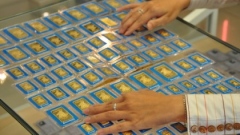Large gold source remains unused amid scarcity
This paradox is due to the regulation that the Saigon Jewelry Company or SJC can only process raw gold into SJC gold bullion for companies that have the gold import license issued by the State Bank of Vietnam.
The regulation is the central bank’s measure to curb the consumption of gold illegally brought from Cambodia and to stabilize exchange rates in the unofficial market.
But the regulation also poses a disadvantage in utilizing gold sources that come from jewelries and other gold products.
For instance, many jewelry shops said they wanted to refine their out-dated products to get raw gold, which can be a large source for making SJC gold bullion.
Currently, there are many companies other than Saigon Jewelry Co that engage in making gold bullion but since their brands are relatively weak compared to SJC, they have asked their gold be remade to bear the SJC brand.
However, the Saigon Jewelry Co turned them down, reiterating the regulation that it can only make bullion for those who have import licenses.
Analysts said the abovementioned sources could supply several tons of raw gold to be made into SJC bullion, which could save the central bank hundreds of millions of dollars in importing gold.
A difficult puzzle
However, it is not easy for the central bank to allow traders to make use of these gold sources as it will encourage gold smuggling from Cambodia, making the exchange rate soar.
On the other hand, if the central bank stays firm on banning domestic gold material to be turned into bullion, the country will have to spend billions of dollars for imports, which can also affect the exchange rate in the longer term.
In fact, gold imports prove to be a temporary solution, as it can only help cool the market for a short time. Prices will shoot up again when the traders have used up their import quotas.
Hence, the central bank still cannot solve its problem of managing the gold market without affecting the exchange rates.
Experts suggested that besides allowing new imports, the central bank should also have a policy to make use of the various domestic gold sources to cool the market.
Duong Thu Huong, general secretary of the Vietnam Bank Association, urged the central bank to set up a gold reserve fund.
“In case the domestic gold price is different from global price, the central bank can use gold from this fund to intervene, saving foreign currency for gold imports,” she explained.
Domestic gold still costly
At the closing of yesterday session, global gold price rose by $50 an ounce over the opening to $1,671.2 an ounce, pulling the domestic metal to VND45.65 million a tael.
With this, the domestic gold price is still higher than its global peer by VND2.5 million a tael.
Dollar selling price at the unofficial market yesterday was quoted at VND21,350 a dollar, down by VND30 a dollar, and buying price VND21,200 a dollar.
What the stars mean:
★ Poor ★ ★ Promising ★★★ Good ★★★★ Very good ★★★★★ Exceptional
Related Contents
Latest News
More News
- Cashless payments hit 28 times GDP in 2025 (February 04, 2026 | 18:09)
- SSIAM and DBJ launch Japan Vietnam Capital Fund (February 04, 2026 | 15:57)
- Banks target stronger profits, credit growth in 2026 (February 04, 2026 | 15:43)
- Vietnam on path to investment-grade rating (February 03, 2026 | 13:07)
- Consumer finance sector posts sharp profit growth (February 03, 2026 | 13:05)
- Insurance market building the next chapter of protection (February 02, 2026 | 11:16)
- NAB Innovation Centre underscores Vietnam’s appeal for tech investment (January 30, 2026 | 11:16)
- Vietnam strengthens public debt management with World Bank and IMF (January 30, 2026 | 11:00)
- Corporate bond market poised for stronger growth cycle (January 28, 2026 | 17:13)
- Vietnam's IPO market on recovery trajectory (January 28, 2026 | 17:04)


 Tag:
Tag:




















 Mobile Version
Mobile Version